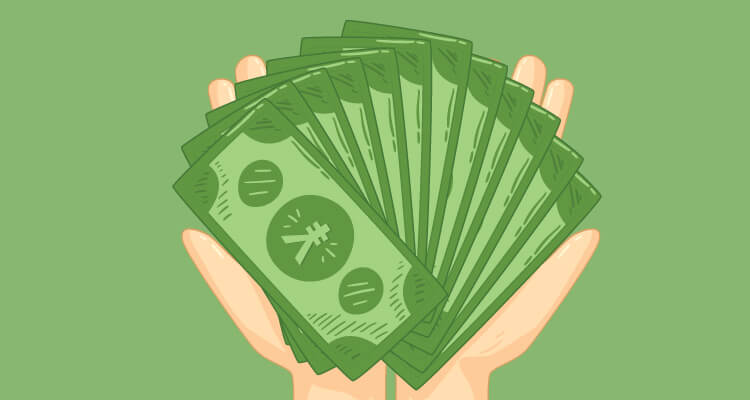When you head to the cash register for a purchase under $10, do you reach for plastic to pay? According to a recent survey, nearly half of Americans prefer to pay with cash for low dollar transactions. While Greenbacks are a popular way to pay for many people, paying cash is rarely the best option.
Let’s dive in and look at how people are paying for small purchases today and if they can do better with alternative payment methods.
Table of Contents
TogglePaying for Small Purchases: Cash is Still Dominant
How most people pay
The new study from CreditCards.com found that for purchases under $10, 45% of Americans prefer cash. Debit came in second with 30% and credit cards came in third at 23%. The survey found that around the $25 price point users switch to credit cards to earn valuable cash back and travel rewards.
Respondents said that they find cash to be the easiest and quickest way to pay for small purchases and may be wary of adding credit card debt or piling on to existing balances. Younger millennials are the most likely to use credit for small purchases, so we may be on an upswing for cards on purchases under $10.
When paying for small purchases, avoiding credit card debt is a very good reason to skip credit cards. But beyond that, credit cards are by far the best way to pay for any transaction, no matter how small.
Why credit cards are the best payment method for any purchase
When you pay cash and something goes wrong, the only recourse you have is getting a refund from the vendor. And that is if they are willing. You get a few more protections from your bank with debit cards, but there are some big risks with using a card tied to your checking account for any purchase. Credit cards give lots of benefits with few drawbacks.
As long as you pay them off in full every month, you’ll never pay any interest on a credit card. Cards also offer the best protection against fraud of any payment method. If a business doesn’t come through with its promises or any unauthorized activity shows up on your account, you have big protections and zero liability, respectively.
If your debit card number leaks and bad guys get ahold of your information, they can drain your bank account and it may take months to get your funds back if you can get them back at all. The protections from cash and debit are subpar compared to what you get from credit cards.
When credit cards don’t make sense
There is one big “what if” when it comes to credit cards. You should know your spending and budgeting habits and make sure you can use credit cards responsibly. If you turn credit cards into new TVs, designer clothes, or anything else you can’t afford, the interest you’ll pay will probably cost you a lot more than the fraud protections are worth.
You may also notice that some merchants charge extra for using credit cards compared to a cash or debit price. It is up to you to decide if the additional fee is worth it. These extra fees used to be against the rules, but now businesses have free rein to charge extra to make up for any fees they have to pay for accepting credit.
Beware the risks of debit cards
We already briefly touched on this, but it is so important to understand the risks of debit cards that it is we are going to look at an example of exactly what can happen if your debit card number leaks. Major breaches from companies like Target and Home Depot impacted millions of card numbers, so it is possible that your account numbers are in the crosshairs.
Let’s say you have a direct deposit in your checking account, which you use as your money hub for bills and other important payments. This may include your rent or mortgage, utilities, and other bills you can’t pay with a credit card.
If you used your debit card and it leaked, you may not know about it for months. But one day, you might log into your online banking and see a series of big unauthorized transactions. These often happen on Friday as hackers know direct deposits typically hit bank accounts on the last day of the week.
If you get hit with fraud on payday, the bad players could steal hundreds or thousands of dollars. That might leave you unable to pay your rent or mortgage. It could lead to missed or late payment fees from other billers. If you can’t pay a credit card, your credit score will suffer.
While banks do offer protections that will likely get your money back, it isn’t instant. With a credit card, those charges are just wiped from your statement and you never have to pay. With a debit card, you need to get the money back. That may take a while. Almost always longer than you have to pay your bills.
Think hard about what you carry in your wallet
Don’t reach to cash or debit because it’s what you’ve always done or it’s what your parents taught you. Credit cards are the best way to pay in almost all scenarios. As long as you can avoid the big fees and won’t use those cards to get into debt, even small purchases should always be made with credit.














